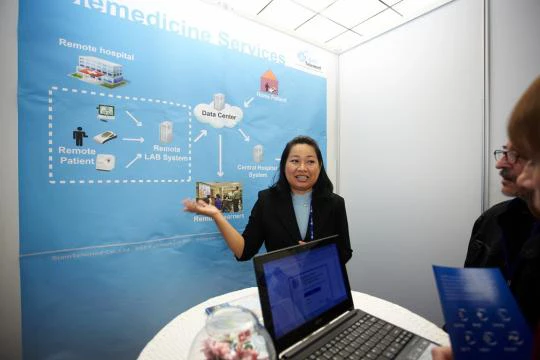A culture of angel investment could help entrepreneurs in developing countries (Credit: infoDev)
Investors and ‘Africanists’ Wesley Lynch and Keet van Zyl, co-founders of AngelHub in South Africa had fascinating things to say about early-stage innovation financing during infoDev’s Global Forum on Innovation and Technology Entrepreneurship in South Africa. Not only did they help in selecting the most inspiring entrepreneurs for the Forum’s Dragons’ Den pitching contest, they were putting forward a lot of passion in explaining how a culture of angel investment for startups and fledging entrepreneurs could be established on the African continent. As access to finance is noted often as the main problem for innovative startups, we should look seriously at models that show potential.
AngelHub’s mission is to bring the experience, mentorship, networks and, of course, financing from already successful businessmen (bonafide angels) together in order to assist South Africa’s new wave of startups. They launched in September 2011. AngelHub’s management draws on the venture capital and start-up experience of its founders to attract both investors and entrepreneurs. A key part of their selection process is finding entrepreneurs that meet their criteria to present to their group of early-stage Angel investors. Their way of working was recently described in this article on ‘Bridging the Funding Divide,’ published by the Daily Maverick.
Three fascinating insights stand out:
On helping entrepreneurs
I looked at some of the AngelHub’s deal flow thanks to the Gust online platform they use to manage their investment process. On average, they get 50 deals a month, and from a precursory glance half of them appear quite meager. They are able to spend a bit more on about 20 deals and select around 10 for further due diligence. Utilizing the full-time effort of four senior professionals, they are able to help these companies with building business models, pitching, etc. and they try to put at least five of them in front of about thirty Angels each quarter. They have also partnered with the University Of Cape Town Graduate School Of Business to present an early-stage investment course that each of the startup companies attend before their pitching sessions. The key to continued success is to broaden the angel community for successful matchups, and to lobby for co-investment initiatives or incentives.
On sustainability of helping entrepreneurs
Pitching events in Johannesburg and Cape Town, regular founders’ dinners, the UCT GSB investment course, full-time intense work with entrepreneurs at no charge and a variety of other operational costs, the sponsorship they receive from corporate strategic partners, and the founding grant from the South African government’s Industrial Development Corporation only pays for 25-30% of AngelHub’s operations. The benefits of AngelHub’s existence in supporting one or two entrepreneurs a month is clear: they receive funding and further engagement of established angels. But the limited engagement that 20 entrepreneurs receive from Wesley and Keet’s team, and the full grooming of 5-10 entrepreneurs as they prepare themselves for the pitching event also accelerates their development at no cost. AngelHub’s path to success lies in the 5% equity option that they take in from their portfolio companies. If a startup receives funding through all this engagement and mentorship, it allows AngelHub to invest in the startup up to 5% of equity ownership. AngelHub remains actively involved post-investment to assist their startups with executing growth strategies.
On working with other players in the enabling ecosystem
As I reflect on infoDev’s current and future work in sustainably developing the private sector, specifically innovative startups in the developing world, I am more convinced that angel networks need to be thought of as effective ecosystem enablers. This in spite of the unfortunate connotation in our (development professionals) minds that supporting them makes rich people richer. Philosophically, there is absolutely no difference between a perfectly capitalist AngelHub and a fully nonprofit government-run incubator in terms of their “desire” to help entrepreneurs. I sure have my own opinions with respect to effectiveness. Needless to say, I look forward to working with Wesley, Keet and team in South Africa and beyond.



Join the Conversation